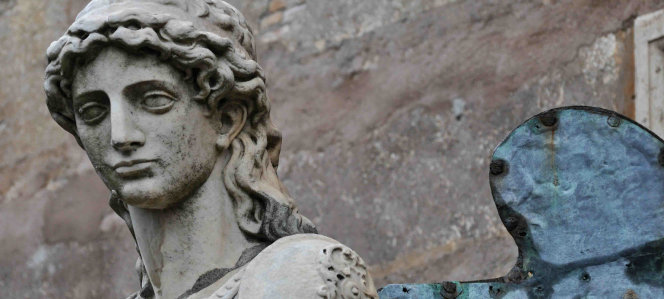The Old Testament scripture that the Church assigns to be proclaimed at Mass for the memorial of the Guardian Angels is an excerpt from the 23rd chapter of the Book of Exodus. In this scripture passage, the God of Israel assures his people that his angel will go before them and “bring you to the Amorites, Hittites, Perizzites, Canaanites, Hivites, Jebusites; and I will wipe them out.”
If this does not provoke an experience of cognitive dissonance one is likely not listening all that attentively.
The warrior angel of Book of Exodus is perhaps not the kind of angel to which the popular culture is all that familiar. Angels have become for many blithe spirits more akin to the good fairy than to the fierce creatures that are described in the Bible. The dissonance between the angel of Exodus and the angels of our imaginations is pronounced.
All this called to mind the work of folklorist Diane Purkiss, who years ago wrote an interesting book titled At the Bottom of the Garden: A Dark History of Faeries, Hobgoblins and Other Troublesome Things. Purkiss’s book is an examination of how beliefs regarding supernatural entities have shifted with cultural trends. Creatures such a faeries, gnomes and elves were at one time presented as things to be feared and avoided. This is in contrast to their presentation in much of the popular culture that imagines such beings to be winsome, beautiful and even cuddly.
What happened? It is complicated. Frightening thoughts are often dealt with through a kind of domestication of the object of our fears so as to render the fearsome innocuous or even friendly. The ancients would have considered such domestication to be foolhardy. Our culture considers this approach to be therapeutic.
Has a similar attempt at domestication taken place in terms of the angelic creatures of the Bible? I think so. The Bible presents angels as fierce and frightening creatures. Angels are warriors (this is, after all, the meaning of “heavenly host”), they are God’s army that he arrays against the forces of sin and death. The ancients believed that these angelic creatures, who stood so close to God, would be beautiful but also terrifying to behold.
The Church celebrates the Guardian Angels, and in doing so expresses our gratitude to the Lord for placing between us and dark powers these noble and fearsome warriors. We are assured that the angels are on our side and fight against the terrors of all unseen evil. These angels should inspire us to move forward with our mission with confidence, courage and tenacity.
But the Church also reminds us today that if it is a mistake to domesticate the angels, it is an even worst mistake to domesticate the Lord God of Hosts. Authentic faith is not about reducing God’s transcendence to something that we can make effortless and easy.
The Scriptures testify and the Apostolic Faith insists that God has given his angels charge of us to watch us in all our ways. God’s power is with us in the presence of holy angels, so let us be bold and risk much for the sake of the mission the Lord has given to us.
